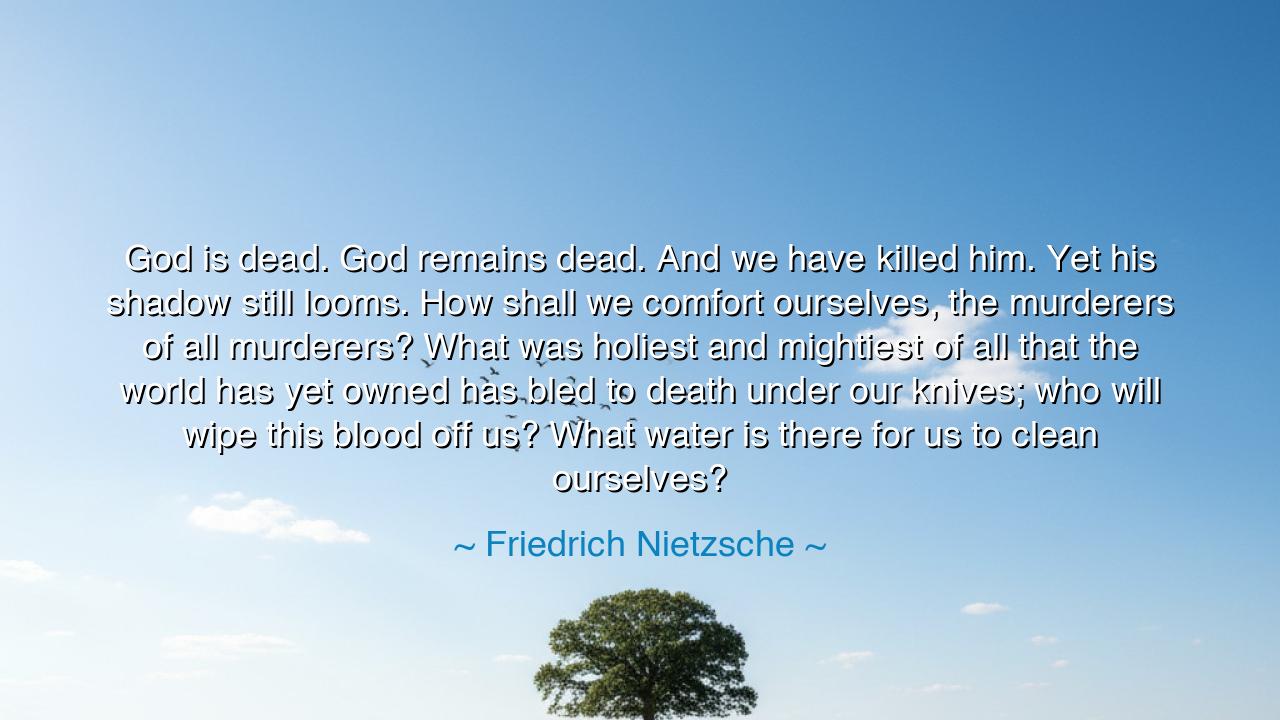
God is dead. God remains dead. And we have killed him. Yet his
God is dead. God remains dead. And we have killed him. Yet his shadow still looms. How shall we comfort ourselves, the murderers of all murderers? What was holiest and mightiest of all that the world has yet owned has bled to death under our knives; who will wipe this blood off us? What water is there for us to clean ourselves?






In the haunting and thunderous words of Friedrich Nietzsche, there resounds one of the most shocking proclamations in the history of philosophy: “God is dead. God remains dead. And we have killed him. Yet his shadow still looms. How shall we comfort ourselves, the murderers of all murderers? What was holiest and mightiest of all that the world has yet owned has bled to death under our knives; who will wipe this blood off us? What water is there for us to clean ourselves?” This cry, both triumphant and tragic, is not a blasphemy — it is a lamentation. Nietzsche does not mock the divine; he mourns the death of meaning, the collapse of the moral and spiritual framework that once bound humanity together. In this cry lies both revelation and despair — for when man slays his gods, he must also face the emptiness left in their wake.
The origin of these words comes from Nietzsche’s The Gay Science and later, Thus Spoke Zarathustra. In them, he presents the parable of the madman, who runs into the marketplace declaring that God is dead. The people laugh, thinking him insane — but the madman’s voice is not madness; it is prophecy. Nietzsche was not speaking of a literal death of a deity, but of the death of belief, the death of the sacred in the modern age. He saw that the rise of science, reason, and secularism had torn down the ancient pillars of faith that once gave human life purpose and order. But in destroying them, humanity had not yet built anything in their place. Thus, he saw the world standing upon a precipice — liberated, yet lost.
To say “God is dead” is to say that mankind has overthrown the idea of an absolute moral order, that it has killed the foundation of its own values. For centuries, humans looked upward for truth and guidance; now, they must look inward. But in this newfound freedom lies a terrible burden — for if there is no divine lawgiver, then man must become his own lawgiver. Nietzsche understood that such freedom could destroy the weak and disorient the strong. Without a higher power to measure good and evil, justice and sin, what would become of humanity? The shadow of God, he warns, still looms — the old habits of faith and morality linger, even after belief has perished. The world walks as a corpse that does not yet know it is dead.
History gives us many mirrors of Nietzsche’s vision. Consider the French Revolution: when the people rose against the Church and monarchy, they declared Reason to be their new god. They tore down altars, abolished religious calendars, and built temples to human logic. Yet in doing so, they unleashed chaos and bloodshed. The faith they destroyed had given structure to their world, and its absence gave birth to madness. Nietzsche foresaw this pattern — that when humanity destroys its old gods without creating new meaning, nihilism follows: a void where nothing is sacred, and everything is permitted.
And yet, Nietzsche did not leave mankind in despair. He believed that out of the ashes of the old faith must rise a new spirit — the Übermensch, or “Overman,” a being who creates his own values, who stands without gods, who draws meaning not from heaven but from the depth of his own will. The Overman is not cruel, but courageous; not faithless, but self-created. Nietzsche’s challenge is thus not a call to atheism alone, but to responsibility — to recognize that if God is dead, then man must take up the divine task of creation himself. Humanity must learn to build cathedrals not of stone, but of spirit.
The question “Who will wipe this blood off us?” remains the most haunting of all. It is not guilt before a god, but guilt before ourselves — the awareness that in killing our source of meaning, we have made ourselves orphans in a cosmic wilderness. Nietzsche’s anguish was not hatred for religion, but sorrow for the moral and spiritual vacuum that followed its decline. He saw that without something sacred — whether divine or human — society becomes hollow, and power becomes its only god. His warning echoes even louder today, when faith is scarce, and distraction replaces reflection.
So, my children of the modern age, take this teaching with trembling reverence. If you have slain your gods, do not live as beasts in the ruins. Do not kill meaning without creating it anew. For the death of the sacred is not the end of responsibility — it is its beginning. Seek not to rebuild the temples of old, but to awaken the divine within your own soul. Create, as Nietzsche urged, your own light, your own law, your own love. Only then shall you wash the blood from your hands — not by water, but by becoming creators, by filling the void with beauty, courage, and wisdom.
For as Friedrich Nietzsche teaches, the death of God is not the end of man — it is the trial of man. The heavens are silent, but the heart still speaks. The old gods are gone, but the eternal fire remains — waiting for those who dare to bear it.






AAdministratorAdministrator
Welcome, honored guests. Please leave a comment, we will respond soon